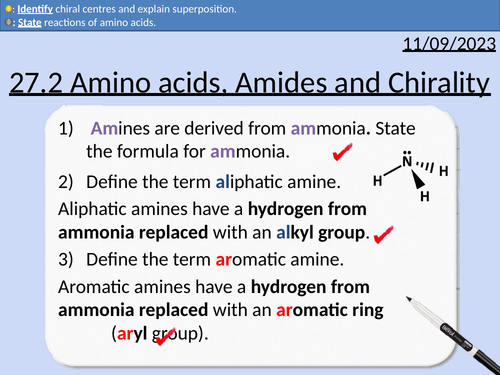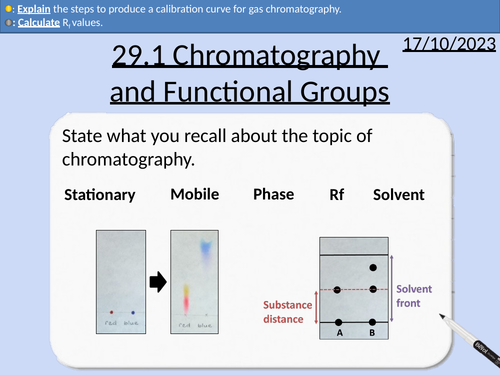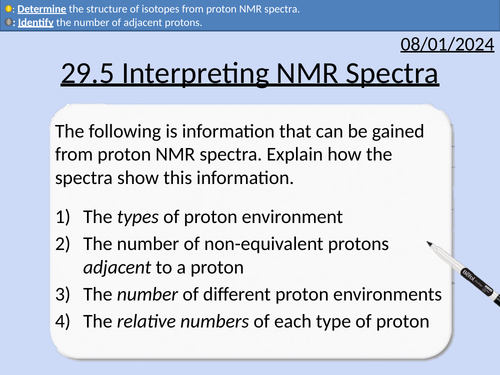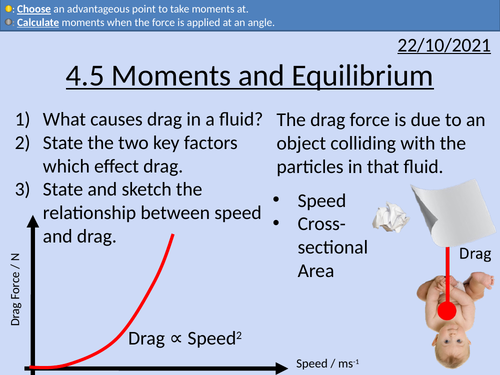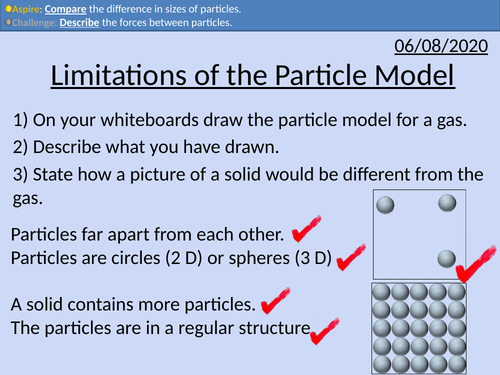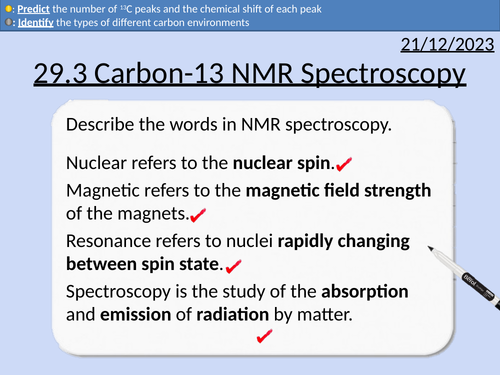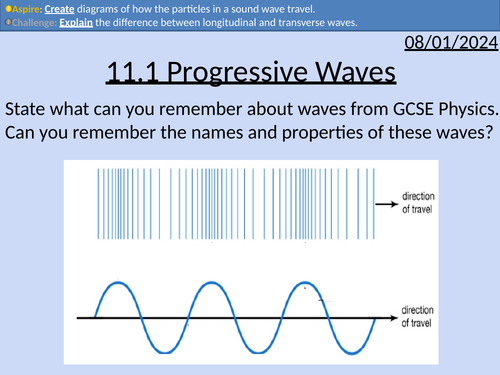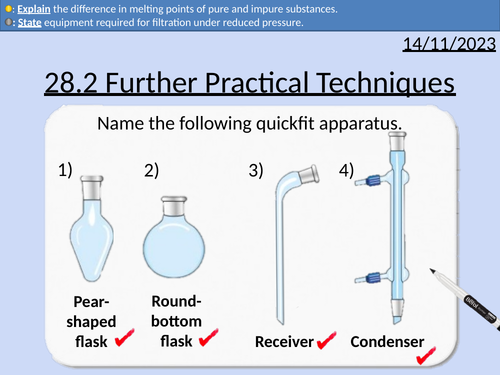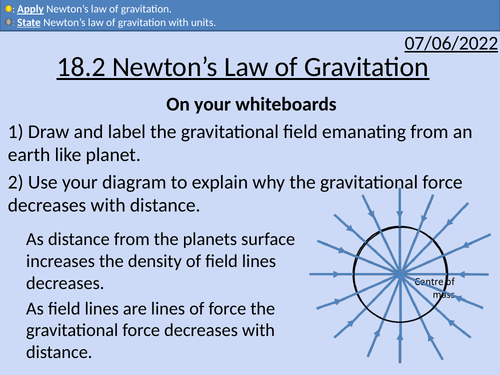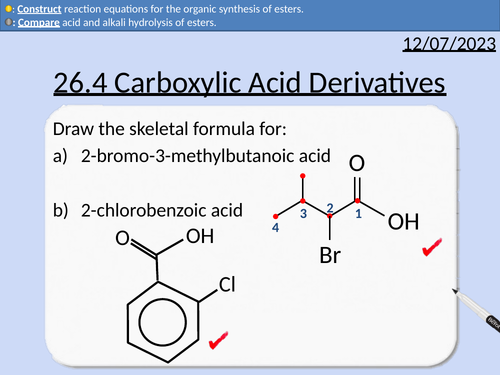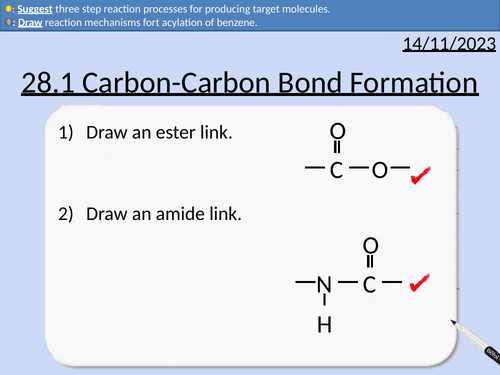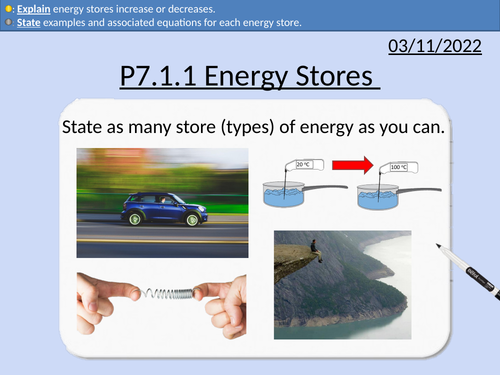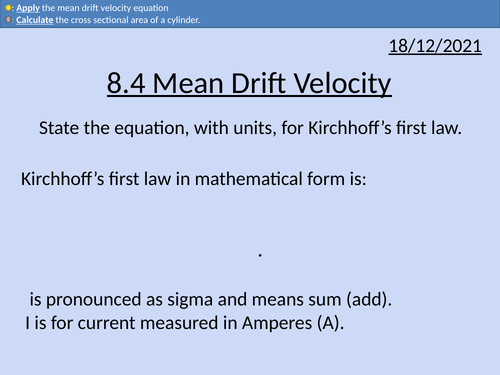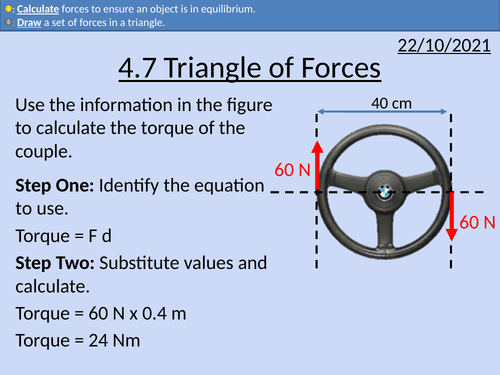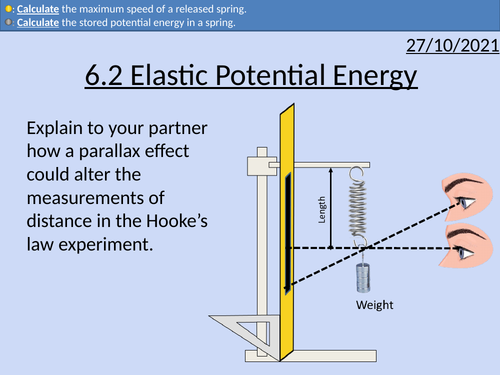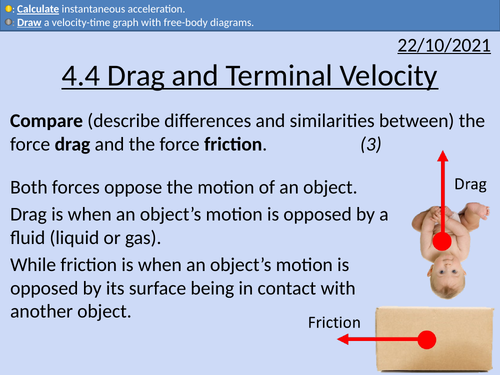497Uploads
169k+Views
72k+Downloads
All resources

A level Chemistry: Amino acids, Amides and Chirality
OCR A level Chemistry: 27.2 Amino acids, Amides and Chirality
This PowerPoint is a whole lesson included with student activities, animated answers, homework questions with answers provided.
This lesson covers:
Locants: alpha, beta, and gamma
Functional groups of amino acids
General formula for amino acids
Reactions of amino acids (alkali and acid)
Esterification of amino acids
Amide functional groups
Naming amide molecules
Drawing optical isomers
Explanation of superimposable and non-superimposable images
Identifying chiral centers

A level Chemistry: Chromatography and Functional Group Analysis
OCR A level Chemistry: 29.1 Chromatography and Functional Group Analysis
This PowerPoint is a whole lesson included with student activities, animated answers, homework questions with answers provided.
This lesson covers:
Thin layer chromatography (TLC)
Rf values
Gas chromatography (GC)
Gas chromatograms
Retention time and peak integrations
Calibration curves from retention time and relative peak area
Differentiation of functional groups: alkene, primary and secondary alcohols, aldehydes, cabonyl compounds, carboxylic acids, and haloalkes.

A level Chemistry: Interpreting Proton NMR Spectra
OCR A level Chemistry: 29.5 Interpreting Proton NMR Spectra
This PowerPoint is a whole lesson included with student activities, animated answers, homework questions with answers provided.
This lesson covers:
Predicting proton NMR spectra for molecules
Identifying the number of different proton environments
Identifying the types of proton environment and chemical shifts
Integration traces (area of peaks) and relative number of protons
The spin-spin splitting pattern (n + 1)

OCR AS level Physics: Moments and Equilibrium
OCR AS level Physics: Moments and Equilibrium is a part of the Module 3: Forces and Motion
Presentation come with worked examples, solutions and homeworks.

GCSE Chemistry: Limitations of the Particle Model
This PowerPoint presentation with worked examples and student questions covers:
• Describing the limitations of the model: lack of forces between particles, size of particles, and space between the particles.
• Mathematically comparing sizes and distances of particles

A level Chemistry: Carbon-13 NMR Spectroscopy
OCR A level Chemistry: 29.3 Carbon-13 NMR Spectroscopyy
This PowerPoint is a whole lesson included with student activities, animated answers, homework questions with answers provided.
This lesson covers:
Identifying different carbon environments
The types of carbon environment
The amount of chemical shift ẟ / ppm

OCR AS Physics: Intensity
OCR AS Physics A: Intensity is a part of the Module 4: Electrons, Waves, and Photons. PowerPoint with worked examples and homework.

OCR AS level Physics: Progressive Waves
OCR AS level Physics: Progressive Waves is a part of the Module 4: Electrons, Waves, and Photons. PowerPoint with worked examples and homework.

OCR A level Physics: Exploring Centripetal Forces
OCR A level Physics: Centripetal Force and the Radian is a part of the Module 5: Newtonian world and astrophysics.
All presentations come with worked examples, solutions and homeworks with answers.

A level Chemistry: Further Practical Techniques
OCR A level Chemistry: 28.2 Further Practical Techniques
This PowerPoint is a whole lesson included with student activities, animated answers, homework questions with answers provided.
This lesson covers:
Filtration under reduced pressure
Purification through Recrystallisation
Preparation of Melting Point Sample
Melting point determination with an electric heater
Melting point determination with a Thiele tube

OCR AS level Physics: Free body diagrams
OCR AS level Physics: Free-body diagrams is a part of the Module 3: Forces and Motion
Presentation come with worked examples, solutions and homeworks.

OCR A Level Physics: Newton's Law of Gravitation
OCR A Level Physics:Newton’s Law of Gravitation presentation, homework and answers.

A level Chemistry: Carboxylic Acid Derivatives
OCR A level Chemistry: 26.3 Carboxylic Acids
This PowerPoint is a whole lesson included with student activities, animated answers, homework questions with answers provided.
This lesson covers:
Naming acyl chlorides
Naming acid anhydrides
Naming esters
Esterification
Acid hydrolysis of esters
Alkali hydrolysis of esters
Producing acyl chlorides from carboxylic acids
Producing carboxylic acids from acyl chlorides
Producing esters from acyl chlorides and phenols
Primary, secondary, and tertiary molecules
Producing primary amides from acyl chlorides
Producing secondary amides with acyl chlorides
Producing esters and carboxylic acids wirh acid anhydride

A level Chemistry: Carbon-Carbon Bond Formation
This PowerPoint is a whole lesson included with student activities, animated answers, homework questions with answers provided.
This lesson covers:
Forming nitriles from haloalkanes
Forming nitriles from aldehydes and ketones
Forming amines from nitriles (reduction)
Forming carboxylic acids from nitriles (hydrolysis)
Friedel-Crafts alkylation of benzene
Acylation of benzene with acyl chloride

GCSE Physics: Energy Stores
This presentation covers OCR Gateway Physics 9-1 P7.1.1 Energy stores
Examples, units, and equations of each energy store:
Kinetic
Gravitational potential
Elastic
Thermal
Magnetic
Electrostatic
Chemical
Nuclear
Student activities with full worked answers also included.

OCR AS level Physics: Mean Drift Velocity
OCR AS level Physics: Mean Drift Velocity is a part of the Module 4: Electrons, Waves, and Photons.
Presentation come with worked examples, solutions and homeworks.
Number density for conductors, semi-conductors, and insulators
Calculating cross-sectional area
Apply the mean drift velocity equation.
Derivation of Mean Drift Velocity Equation

OCR AS level Physics: Triangle of Forces
OCR AS level Physics: Triangle of Forces is a part of the Module 3: Forces and Motion
Presentation come with worked examples, solutions and homeworks.

OCR AS level Physics: Elastic Potential Energy
OCR AS level Physics: Elastic Potential Energy is a part of the Module 3: Materials
Presentation come with worked examples, solutions and homeworks.

OCR AS level Physics: Drag and Terminal Velocity
OCR AS level Physics: Drag and Terminal Velocity is a part of the Module 3: Forces and Motion
Presentation come with worked examples, solutions and homeworks.
Drag and speed relationship
Free body diagrams
Net forces and acceleration

OCR A level Physics: Angular Acceleration
OCR A level Physics: Angular Acceleration and the Radian is a part of the Module 5: Newtonian world and astrophysics.
All presentations come with worked examples, solutions and homeworks with answers.

